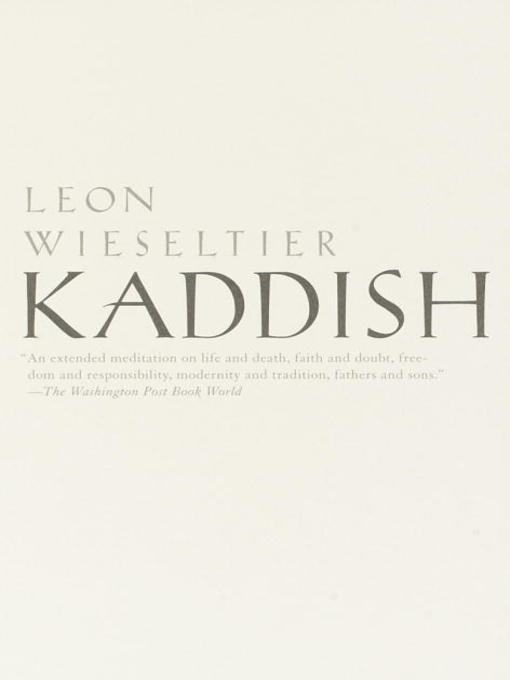- All Magazines
- Popular Magazines: Always Available
- Cooking and Food Magazines
- Craft Magazines
- News and Politics
- See all magazines collections
Children have obligations to their parents: the Talmud says "one must honor him in life and one must honor him in death." Beside his father’s grave, a diligent but doubting son begins the mourner’s kaddish and realizes he needs to know more about the prayer issuing from his lips. So begins Leon Wieseltier’s National Jewish Book Award–winning autobiography, Kaddish, the spiritual journal of a man commanded by Jewish law to recite a prayer three times daily for a year and driven, by ardor of inquiry, to explore its origins. Here is one man’s urgent exploration of Jewish liturgy and law, from the 10th-century legend of a wayward ghost to the speculations of medieval scholars on the grief of God to the perplexities of a modern rabbi in the Kovno ghetto. Here too is a mourner’s unmannered response to the questions of fate, freedom, and faith stirred in death’s wake. Lyric, learned, and deeply moving, Wieseltier’s Kaddish is a narrative suffused with love: a son’s embracing the tradition bequeathed to him by his father, a scholar’s savoring they beauty he was taught to uncover, and a writer’s revealing it, proudly, unadorned, to the reader.
-
Creators
-
Publisher
-
Release date
August 19, 2009 -
Formats
-
Kindle Book
-
OverDrive Read
- ISBN: 9780307557230
-
EPUB ebook
- ISBN: 9780307557230
- File size: 2098 KB
-
-
Languages
- English
-
Reviews
-
Publisher's Weekly
August 31, 1998
When his father died in 1996, Wieseltier began to observe the Jewish rituals of the traditional year of mourning, going three times daily to synagogue to recite Kaddish, the prayer for the dead. Between the prayers and his daily work as literary editor of the New Republic, he sought out ancient, medieval and modern Jewish texts in an effort to understand the history and meaning of Kaddish. He discovered that early texts dictated that the mourner's kaddish be recited only on Saturday nights, but the prayers were prolonged so that the souls of the sinners of Israel released from Gehenna would not hurry back to hell. Wieseltier reports that through his study and practice of Kaddish he realized that the past is at the mercy of the present. "The present can condemn the past to oblivion or obscurity," he notes. "Whatever happens to the past will happen to it posthumously. And so the saga of the family is also the saga of the tradition." Wieseltier provides a work of history, philosophy and spiritual memoir where he deals with the meaning of freedom and the perplexity of tradition. His book demonstrates how the practice of religion meets the needs of a troubled soul.
-
Formats
- Kindle Book
- OverDrive Read
- EPUB ebook
Languages
- English
Loading
Why is availability limited?
×Availability can change throughout the month based on the library's budget. You can still place a hold on the title, and your hold will be automatically filled as soon as the title is available again.
The Kindle Book format for this title is not supported on:
×Read-along ebook
×The OverDrive Read format of this ebook has professional narration that plays while you read in your browser. Learn more here.

